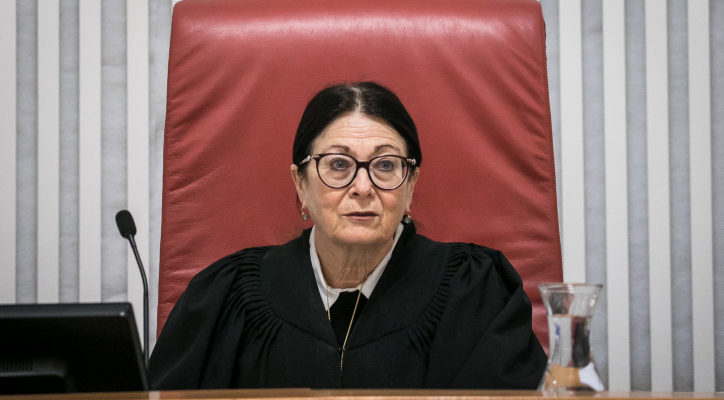Opinion poll reveals record low levels of public trust in the Supreme Court and the State Attorney’s office.
By Lauren Marcus, World Israel News
An opinion poll released Monday on public trust in Israeli institutions revealed that 40 percent of Israelis do not trust the Supreme Court.
The poll, conducted by researchers from polling organization BrainPower, reported that even more Israelis (47%) say they do not trust the attorney general and State Attorney’s office. According to the poll, the most trusted institution in Israel is the IDF, with 81 percent of respondents reporting strong faith in the army.
The numbers reflect a significant drop in public trust for the court and legal system over the last three decades. In 1991, just three percent of Israelis reported distrusting the Supreme Court. The number quadrupled by 2016, reaching 12 percent in a study conducted that year.
Pollsters noted a strong correlation between trust in the Supreme Court and political affiliation. Israelis who identified themselves as right-wing, religious,and ultra-Orthodox party voters were significantly more likely to report distrusting the court, whereas left-wing citizens and voters of the Arab Joint List reported high levels of trust in the institution.
Israel’s Supreme Court is widely considered to favor left-wing causes and policies and has come under fire in recent years for judicial activism. Critics have charged the Supreme Court with overstepping its authority and issuing rulings based on the justices’ political preferences, rather than the law.
Last week, the Supreme Court overturned a law banning visitors from bringing chametz, or bread, products into hospitals during Passover.
“The judges are full of arrogance,” said MK Moshe Gafni in response to that ruling. “What we legislate through endless discussions and meetings and four votes in the Knesset plenum, they annul with a decision that is not based on any reason, arbitrarily ruling according to their worldview.”
Transportation Minister Betzalel Smotrich said, “The Supreme Court seems to be running the state and making more and more decisions in a way that renders the democratic system and the people superfluous. The question is: When will the people wake up and realize it’s gone too far?”
The chametz decision is the latest in a series of rulings that have sparked outrage across the Jewish state. In February, the Supreme Court overturned the Election Committee’s decision to ban Heba Yazback from running for the Knesset.
Yazback was banned as a candidate due to concerns raised by several parties after she posted content praising terrorists and advocating for armed conflict against Israel on her social media pages.
MK Ayelet Shaked said she was disturbed that “the Supreme Court said a terrorist supporter was eligible” for a Knesset run. Yazback was placed eighth on the Joint List’s candidate list for the March 2020 election and is now a sitting member of the Knesset.
Israel Beiteinu Chair Avigdor Liberman said, “This is a very unfortunate decision by the Supreme Court… The fact that the court overturned the Election Committee’s decision is a reward for the supporters of terrorism.”
Justice Minister Amir Ohana has also clashed with the Supreme Court. After suggesting in an interview that not all of the Supreme Court’s decisions should be respected, Supreme Court Justice Esther Hayut blasted Ohana, accusing him of “sharing with us an unprecedented and irresponsible judicial worldview…with that worldview, the path to anarchy is short.”
Ohana responded in a speech to the Israeli Bar Association, saying, “Anyone who wants a strong justice system, anyone who wants what is best for the justice system — must be prepared to criticize it, and criticism also means change.”
“Can it truly be claimed that the way judges are appointed allows the necessary pluralism? Can we ignore the public’s sense of a growing rift between the terms ‘law’ and ‘justice’? I see only one branch [of government] that has no checks and balances.”




